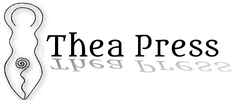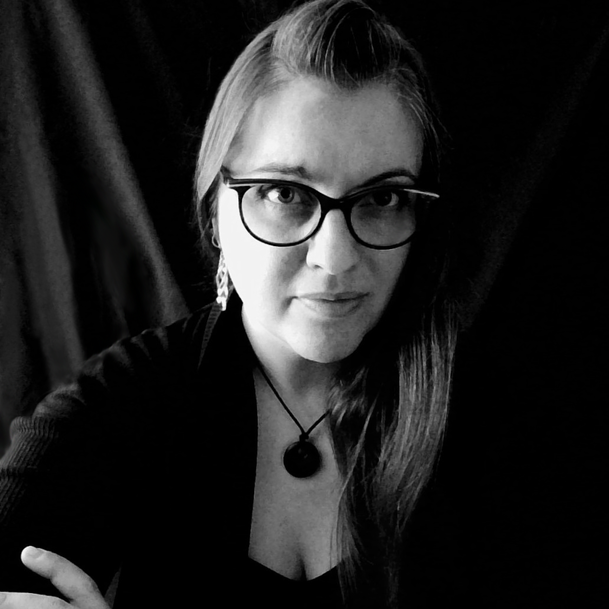In honor of Small Press Month, Thea Press interviewed M. Kate Allen. Kate is the award-winning author of the Thean Psalter, the Sticky Ones series, Memory Stands Still, Playing Gauche, and more.
What inspired you to start writing? I received a purple diary with a lock and key from Sears when I was ten years old. That diary prompted me to consider that writing might be an interesting thing to do. Later, in eighth grade, I had the opportunity to write a short story for my language arts class, and I spent a chunk of my music class covertly scribbling a story about hidden treasure and pirates. In high school, I took creative writing and journalistic writing and began to win awards for my writing. I ventured away from writing for pleasure as I pursued higher education, and when that bit of my journey concluded many years later, I returned to writing what I wanted to write.
What does your writing process look like? My writing process often involves sitting down at my black wooden desk, lighting a candle, arranging my legs like a pretzel on my desk chair, and doing a brain dump in my online journal. Once I get all the surface-level thoughts flowing, my words usually reveal what I'm most interested in working on writing-wise. I regularly share new ideas I'm having with trusted friends, and their feedback prompts me to look at my ideas from different angles.
Of your various writings, what is one of your favorites? Why? One of my favorite pieces of writing is my first book in the Sticky Ones series, Crystal Winters and the Haunted Mansion. It has many of my favorite story elements: a bold protagonist, a haunted mansion, strange characters, dusty rooms, an unusual mystery, and delicious food.
What are your thoughts on the use of AI tools (e.g. ChatGPT) during the creative process? I used an AI bot once to ask questions for writing research and didn't find it much more useful than doing an ordinary internet search. As far as utilizing AI to do the actual work of writing a book, story, poem, or an essay for me, I have not tried that and I don't think I'll ever want to (and if I did, I would feel a sense of responsibility to declare it).
Tell us about one or more of your favorite writers and how they've impacted you. I remember being introduced to The Beekeeper's Apprentice by Laurie R. King in the early 2000s. As soon as Mary Russell offered her assessment of what Sherlock Holmes was observing in the opening scene, my worldview cracked. I found myself breaking free of a container I hadn't realized I was stuck in. The writers who most inspire me are those who help me enter a story through the portals of place and myth. In no particular order, Lawrence Thornton, Rudolfo Anaya, Silvia Moreno-Garcia, Alice Walker, Juliet Blackwell, Sarah Addison Allen, Neil Gaiman, David Whyte, Mary Oliver, Robert Pirsig, Danielle Dulsky, Shirley Jackson, Stephen King, Clive Barker, Terry Pratchett, Sarah J. Maas, Starhawk, and Dr. Clarissa Pinkola Estés are a few who transport me (and there are many more).
What has writing taught you about the world and yourself? I've learned from writing that I'm more than my thoughts or feelings in a given moment. Likewise, the people in my life are more than my thoughts or feelings about them. Recognizing this has helped me recognize the limits of my vision and taught me to keep looking for what I don't yet see. This seems like a vital ingredient in the recipe for healing the world. I've also learned that the horror genre is particularly suited to healing precisely because it bears witness to humanity's deepest wounds and reveals to us how we wound/are wounded.
What advice do you have for aspiring writers? Read and write whatever moves and/or pleases you. Give yourself permission to stop and start as often as you want. Ritualize your creative process in whatever way delights and soothes you. Indulge in every subject that interests you without asking for permission first. Practice saying "no" to anything that you'd rather not do--without explanation. Seek out the gold nuggets in critical feedback and let the rest go. When you're ready to market your writing, make a one-year plan that leaves plenty of room for you to have a life, stick to the plan in whatever way works best for you, and celebrate each milestone with trusted family and friends. At the end of the year, review how things went, gather up lessons for moving forward, and start again.
Hailing from Canton, Ohio, award-winning author M. Kate Allen has made her way to Cleveland, Berlin, central Minnesota, the San Francisco Bay Area, and beyond in search of unusual story seeds that she can nurture into full bloom. She is a fan of places where history and memory are well-tended, and she especially enjoys reading/writing about places as characters. These days her home is in Tempe, Arizona, where she craves the monsoon scent of creosote and the springtime scent of orange blossoms. When she's not writing books, she can often be found discussing the meaning of life with her daughters, eating her spouse's unrivaled culinary creations, sitting in circle with wild-hearted friends, or reading a book.
Contact: Kate can be reached by e-mail at [email protected]. You can also check out her website and find her on Facebook, Instagram, Patreon, TikTok, and YouTube.
What inspired you to start writing? I received a purple diary with a lock and key from Sears when I was ten years old. That diary prompted me to consider that writing might be an interesting thing to do. Later, in eighth grade, I had the opportunity to write a short story for my language arts class, and I spent a chunk of my music class covertly scribbling a story about hidden treasure and pirates. In high school, I took creative writing and journalistic writing and began to win awards for my writing. I ventured away from writing for pleasure as I pursued higher education, and when that bit of my journey concluded many years later, I returned to writing what I wanted to write.
What does your writing process look like? My writing process often involves sitting down at my black wooden desk, lighting a candle, arranging my legs like a pretzel on my desk chair, and doing a brain dump in my online journal. Once I get all the surface-level thoughts flowing, my words usually reveal what I'm most interested in working on writing-wise. I regularly share new ideas I'm having with trusted friends, and their feedback prompts me to look at my ideas from different angles.
Of your various writings, what is one of your favorites? Why? One of my favorite pieces of writing is my first book in the Sticky Ones series, Crystal Winters and the Haunted Mansion. It has many of my favorite story elements: a bold protagonist, a haunted mansion, strange characters, dusty rooms, an unusual mystery, and delicious food.
What are your thoughts on the use of AI tools (e.g. ChatGPT) during the creative process? I used an AI bot once to ask questions for writing research and didn't find it much more useful than doing an ordinary internet search. As far as utilizing AI to do the actual work of writing a book, story, poem, or an essay for me, I have not tried that and I don't think I'll ever want to (and if I did, I would feel a sense of responsibility to declare it).
Tell us about one or more of your favorite writers and how they've impacted you. I remember being introduced to The Beekeeper's Apprentice by Laurie R. King in the early 2000s. As soon as Mary Russell offered her assessment of what Sherlock Holmes was observing in the opening scene, my worldview cracked. I found myself breaking free of a container I hadn't realized I was stuck in. The writers who most inspire me are those who help me enter a story through the portals of place and myth. In no particular order, Lawrence Thornton, Rudolfo Anaya, Silvia Moreno-Garcia, Alice Walker, Juliet Blackwell, Sarah Addison Allen, Neil Gaiman, David Whyte, Mary Oliver, Robert Pirsig, Danielle Dulsky, Shirley Jackson, Stephen King, Clive Barker, Terry Pratchett, Sarah J. Maas, Starhawk, and Dr. Clarissa Pinkola Estés are a few who transport me (and there are many more).
What has writing taught you about the world and yourself? I've learned from writing that I'm more than my thoughts or feelings in a given moment. Likewise, the people in my life are more than my thoughts or feelings about them. Recognizing this has helped me recognize the limits of my vision and taught me to keep looking for what I don't yet see. This seems like a vital ingredient in the recipe for healing the world. I've also learned that the horror genre is particularly suited to healing precisely because it bears witness to humanity's deepest wounds and reveals to us how we wound/are wounded.
What advice do you have for aspiring writers? Read and write whatever moves and/or pleases you. Give yourself permission to stop and start as often as you want. Ritualize your creative process in whatever way delights and soothes you. Indulge in every subject that interests you without asking for permission first. Practice saying "no" to anything that you'd rather not do--without explanation. Seek out the gold nuggets in critical feedback and let the rest go. When you're ready to market your writing, make a one-year plan that leaves plenty of room for you to have a life, stick to the plan in whatever way works best for you, and celebrate each milestone with trusted family and friends. At the end of the year, review how things went, gather up lessons for moving forward, and start again.
Hailing from Canton, Ohio, award-winning author M. Kate Allen has made her way to Cleveland, Berlin, central Minnesota, the San Francisco Bay Area, and beyond in search of unusual story seeds that she can nurture into full bloom. She is a fan of places where history and memory are well-tended, and she especially enjoys reading/writing about places as characters. These days her home is in Tempe, Arizona, where she craves the monsoon scent of creosote and the springtime scent of orange blossoms. When she's not writing books, she can often be found discussing the meaning of life with her daughters, eating her spouse's unrivaled culinary creations, sitting in circle with wild-hearted friends, or reading a book.
Contact: Kate can be reached by e-mail at [email protected]. You can also check out her website and find her on Facebook, Instagram, Patreon, TikTok, and YouTube.
©2024 Thea Press. All Rights Reserved.


